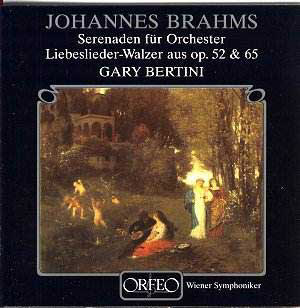These are thoroughly delightful performances of delightful
repertoire. Gary Bertini (born 1927), one of those excellent conductors
who doesn’t enjoy the attention he deserves, secures nimble and amiable
playing from the VSO.
It sounds as if the string sections are reduced. This
brings the woodwind into equality and gives lithe attack well suited
to the youthful, would-be symphony that masquerades as the Op.11 Serenade.
Bertini brings a just balance to the music’s symphonic import – first
movement repeat observed – while the delicacy of timbral interplay reminds
of Mendelssohn. It’s good to hear Brahms slimmed down; he was young
once! Bertini doesn’t milk the music or make it too plush, something
I think Kertesz does do to some extent in his much-admired Decca recordings.
Personally, I’m very fond of Michael Tilson Thomas’s Sony tapings, also
the LSO, which have a similar lightness of touch to Bertini’s.
The bucolic woodwind playing of the VSO is a particularly
happy feature of these performances. Bertini lets the music flow; the
first ‘Scherzo’, which can drag, has the right amount of momentum and
dance-like pulse. Equally the ‘Adagio non troppo’, normally about 15
minutes, is here over in 11; again there’s no sense of haste, unlike
in Sir Adrian Boult’s EMI recordings, where the slow movements of both
serenades sound a tad harried. I suspect Sir Adrian might have been
conscious of his great age; not wanting to appear sluggish, he over-compensated.
Having mentioned Mendelssohn for the first movement,
it’s Dvořák that surfaces in the fourth
movement ‘Menuetto’; there are two in fact, the second is once again
of Mendelssohnian caste, the VSO woodwind to the fore. There’s a real
spring in the step, and this I think is Bertini’s success – in keeping
the music moving he is resourceful in ensuring that rhythm and
melody are united; the music swings and sings, the ‘Finale’ is pertinently
not rushed.
Just occasionally the horn timbre struck me as a little
blowsy, and the violins could do with a bit more body. The recording,
clear and well balanced, is a tad compromised in dynamic contrasts if
very clear regarding detail.
The Second Serenade is a mellower piece; there are
no violins in the scoring. Again, Bertini lets the music flow. This
emphasis on the domestic nature of the music may not appeal to those
who like something more refulgent and moulded but I feel, even allowing
a suspicion that Bertini leans slightly too far the other way, that
he is nearer the spirit of the music. Certainly regarding buoyancy and
clarity he is hard to beat – these are serenades with rustic colours
rather than city slickness, although, as Bertini reveals, this is also
music of sophistication. The darker hues of the A major Serenade are
a portent of later Brahms, the slow movement a slithery being of the
night, an operatic scena seems to thread through the woodwinds’ web;
the succeeding ‘Quasi Menuetto’ (when is a minuet not a minuet) is rather
poignant, a quality Bertini seizes on.
Hopefully this release sells as ‘2-for-1’, the second
CD plays for 13 minutes! This ‘waltz-suite’ is, according to the notes,
by Brahms himself, something not discovered until 1938, a version for
soprano, chorus and small orchestra of movements from his opuses 52
and 65, originally written for vocal quartet and piano (four hands).
I would be a little suspicious about the composer being responsible
for this arrangement. I recall Antal Dorati doing something similar
in what turned out to be his last London concert. There he had four
student singers and a handful of Royal Philharmonic players. I don’t
recall a choir, and I think an arranger was given a credit.
No matter, these are charming pieces brought off with
affection, an attractive encore to very pleasurable accounts of the
two Serenades.
Colin Anderson


